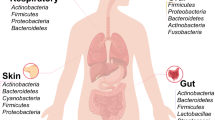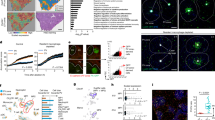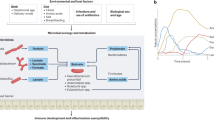Abstract
Maintenance of intestinal barrier function contributes to gastrointestinal homeostasis and therefore cardiovascular diseases. A number of studies show that intestinal permeability is affected by excessive inflammatory responses. Krüppel-like factor (KLF) 4 is one of the critical transcriptional factors, which controls multiple immune responses. In this study we investigated the role of KLF4 in regulating intestinal inflammation and permeability during the atherosclerotic process. Atherosclerotic model was established in ApoE−/− mice by feeding a high fat high cholesterol (HFHC) diet. We showed that colon expression levels of KLF4 and tight junction proteins were significantly decreased whereas inflammatory responses increased in atherosclerotic mice. Overexpression of colon epithelial Klf4 decreased atherosclerotic plaque formation and vascular inflammation in atherosclerotic mice, accompanied by remarkable suppression of intestinal NF-κB activation. We found that overexpression of epithelial Klf4 in atherosclerotic mice significantly increased intestinal tight junction expression and ameliorated endotoxemia, whereas replenishment of LPS abolished these benefits. Overexpression of Klf4 reversed LPS-induced permeability and downregulation of ZO-1 and Occludin in Caco-2 cells in vitro. HFHC diet stimulated the expression of epithelial microRNA-34a, whereas silence of epithelial Klf4 abolished the benefits of microRNA-34a sponge, a specific miR-34a inhibitor, on intestinal permeability and atherosclerotic development. A clinical cohort of 24 atherosclerotic patients supported colon KLF4/NF-κB/tight junction protein axis mediated intestine/cardiovascular interaction in patients with atherosclerosis. Taken together, intestinal epithelial KLF4 protects against intestinal inflammation and barrier dysfunction, ameliorating atherosclerotic plaque formation.
This is a preview of subscription content, access via your institution
Access options
Subscribe to this journal
Receive 12 print issues and online access
$259.00 per year
only $21.58 per issue
Buy this article
- Purchase on Springer Link
- Instant access to full article PDF
Prices may be subject to local taxes which are calculated during checkout








Similar content being viewed by others
References
Gill SK, Rossi M, Bajka B, Whelan K. Dietary fibre in gastrointestinal health and disease. Nat Rev Gastroenterol Hepatol. 2021;18:101–16.
Adolph TE, Meyer M, Schwarzler J, Mayr L, Grabherr F, Tilg H. The metabolic nature of inflammatory bowel diseases. Nat Rev Gastroenterol Hepatol. 2022;19:753–67.
Buckley A, Turner JR. Cell biology of tight junction barrier regulation and mucosal disease. Cold Spring Harb Perspect Biol. 2018;10:a029314.
Slifer ZM, Blikslager AT. The integral role of tight junction proteins in the repair of injured intestinal epithelium. Int J Mol Sci. 2020;21:972.
Sharma D, Malik A, Guy CS, Karki R, Vogel P, Kanneganti TD. Pyrin inflammasome regulates tight junction integrity to restrict colitis and tumorigenesis. Gastroenterology. 2018;154:948–64 e8.
Kuo WT, Shen L, Zuo L, Shashikanth N, Ong M, Wu L, et al. Inflammation-induced occludin downregulation limits epithelial apoptosis by suppressing caspase-3 expression. Gastroenterology. 2019;157:1323–37.
Li J, Lin S, Vanhoutte PM, Woo CW, Xu A. Akkermansia muciniphila protects against atherosclerosis by preventing metabolic endotoxemia-induced inflammation in ApoE−/− mice. Circulation. 2016;133:2434–46.
Nie H, Xiong Q, Lan G, Song C, Yu X, Chen L, et al. Sivelestat alleviates atherosclerosis by improving intestinal barrier function and reducing endotoxemia. Front Pharmacol. 2022;13:838688.
Pan Y, Hui X, Hoo RLC, Ye D, Chan CYC, Feng T, et al. Adipocyte-secreted exosomal microRNA-34a inhibits M2 macrophage polarization to promote obesity-induced adipose inflammation. J Clin Invest. 2019;129:834–49.
Kapoor N, Niu J, Saad Y, Kumar S, Sirakova T, Becerra E, et al. Transcription factors STAT6 and KLF4 implement macrophage polarization via the dual catalytic powers of MCPIP. J Immunol. 2015;194:6011–23.
Khan MJ, Singh P, Dohare R, Jha R, Rahmani AH, Almatroodi SA, et al. Inhibition of miRNA-34a promotes M2 macrophage polarization and improves LPS-induced lung injury by targeting Klf4. Genes. 2020;11:966.
Ghaleb AM, McConnell BB, Kaestner KH, Yang VW. Altered intestinal epithelial homeostasis in mice with intestine-specific deletion of the Kruppel-like factor 4 gene. Dev Biol. 2011;349:310–20.
Tong L, Tang C, Cai C, Guan X. Upregulation of the microRNA rno-miR-146b-5p may be involved in the development of intestinal injury through inhibition of Kruppel-like factor 4 in intestinal sepsis. Bioengineered. 2020;11:1334–49.
Li B, Dou Z, Zhang L, Zhu L, Cao Y, Yu Q. Ghrelin alleviates intestinal dysfunction in sepsis through the KLF4/MMP2 regulatory axis by activating SIRT1. Front Immunol. 2021;12:646775.
Chen X, Wen J, Liu C, Guo D. KLF4 downregulates FGF21 to activate inflammatory injury and oxidative stress of LPSinduced ATDC5 cells via SIRT1/NFkappaB/p53 signaling. Mol Med Rep. 2022;25:164.
Xu Y, Xu Y, Zhu Y, Sun H, Juguilon C, Li F, et al. Macrophage miR-34a is a key regulator of cholesterol efflux and atherosclerosis. Mol Ther J Am Soc Gene Ther. 2020;28:202–16.
Song L, Chen TY, Zhao XJ, Xu Q, Jiao RQ, Li JM, et al. Pterostilbene prevents hepatocyte epithelial-mesenchymal transition in fructose-induced liver fibrosis through suppressing miR-34a/Sirt1/p53 and TGF-beta1/Smads signalling. Br J Pharmacol. 2019;176:1619–34.
Wells CL, Jechorek RP, Olmsted SB, Erlandsen SL. Effect of LPS on epithelial integrity and bacterial uptake in the polarized human enterocyte-like cell line Caco-2. Circ Shock. 1993;40:276–88.
Round JL, Mazmanian SK. The gut microbiota shapes intestinal immune responses during health and disease. Nat Rev Immunol. 2009;9:313–23.
Wang Y, Li D, Jia Z, Hui J, Xin Q, Zhou Q, et al. A bibliometric analysis of research on the links between gut microbiota and atherosclerosis. Front Cardiovasc Med. 2022;9:941607.
Graham DB, Xavier RJ. Pathway paradigms revealed from the genetics of inflammatory bowel disease. Nature. 2020;578:527–39.
Chen K, Shao LH, Wang F, Shen XF, Xia XF, Kang X, et al. Netting gut disease: neutrophil extracellular trap in intestinal pathology. Oxid Med Cell Longev. 2021;2021:5541222.
Lawrence T, Natoli G. Transcriptional regulation of macrophage polarization: enabling diversity with identity. Nat Rev Immunol. 2011;11:750–61.
Shen Y, Hong H, Sangwung P, Lapping S, Nayak L, Zhang L, et al. Kruppel-like factor 4 regulates neutrophil activation. Blood Adv. 2017;1:662–8.
Liao X, Sharma N, Kapadia F, Zhou G, Lu Y, Hong H, et al. Kruppel-like factor 4 regulates macrophage polarization. J Clin Invest. 2011;121:2736–49.
Ghaleb AM, Yang VW. Kruppel-like factor 4 (KLF4): What we currently know. Gene. 2017;611:27–37.
Fu C, Hao S, Xu X, Zhou J, Liu Z, Lu H, et al. Activation of SIRT1 ameliorates LPS-induced lung injury in mice via decreasing endothelial tight junction permeability. Acta Pharmacol Sin. 2019;40:630–41.
Haghikia A, Zimmermann F, Schumann P, Jasina A, Roessler J, Schmidt D, et al. Propionate attenuates atherosclerosis by immune-dependent regulation of intestinal cholesterol metabolism. Eur Heart J. 2022;43:518–33.
Yoshida N, Emoto T, Yamashita T, Watanabe H, Hayashi T, Tabata T, et al. Bacteroides vulgatus and bacteroides dorei reduce gut microbial lipopolysaccharide production and inhibit atherosclerosis. Circulation. 2018;138:2486–98.
Yu T, Chen X, Lin T, Liu J, Li M, Zhang W, et al. KLF4 deletion alters gastric cell lineage and induces MUC2 expression. Cell Death Dis. 2016;7:e2255.
Acknowledgements
This work was financially supported by Guangdong Basic and Applied Basic Research Foundation (2023A1515030096), Basic Research Fund of Shenzhen Science and Technology Innovation Commission (JCYJ20220530154002006 and JCYJ20220530154003007), National Natural Science Foundation of China (81902113), Medical Scientific Research Foundation of Guangdong Province (A2022308), and Scientific Research Foundation for Young Teacher of Shenzhen University (000002111207).
Author information
Authors and Affiliations
Contributions
HZRN, XHY, HQH and TY performed the experiments and analyzed data. HZRN, YWZ, CGY, and LFL discussed data. HZRN drafted the manuscript. YWZ guided the clinical experiments, and YP designed, guided the whole study and edited manuscript.
Corresponding author
Ethics declarations
Competing interests
The authors declare no competing interests.
Rights and permissions
Springer Nature or its licensor (e.g. a society or other partner) holds exclusive rights to this article under a publishing agreement with the author(s) or other rightsholder(s); author self-archiving of the accepted manuscript version of this article is solely governed by the terms of such publishing agreement and applicable law.
About this article
Cite this article
Nie, Hzr., Zhou, Yw., Yu, Xh. et al. Intestinal epithelial Krüppel-like factor 4 alleviates endotoxemia and atherosclerosis through improving NF-κB/miR-34a-mediated intestinal permeability. Acta Pharmacol Sin (2024). https://doi.org/10.1038/s41401-024-01238-3
Received:
Accepted:
Published:
DOI: https://doi.org/10.1038/s41401-024-01238-3



